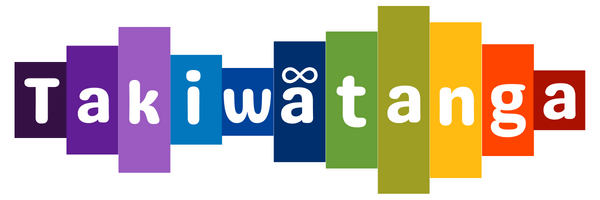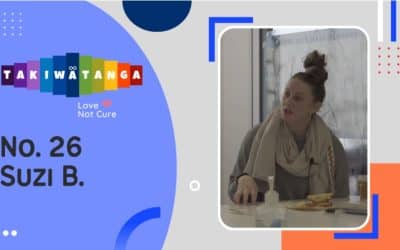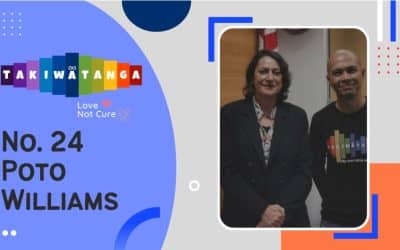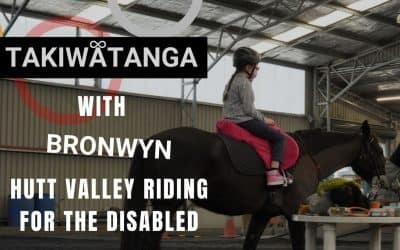Takiwātanga with Lloyd I AM
My Own time and space | Love not Cure
S01 E05: Exploring Autism Training Take away
UNEDITED Transcript
Pre Intro message:
What benefits do you think you can get out of joining or participating in training about autism?
Intro:
This is Lloyd I AM and you are listening to Takiwatanga, love not cure, exploring autism one strength at a time.
Body:
Hello again, how are you all doing today? I hope everyone is doing ok. I know it’s pretty tough these days, especially with what’s happening around us. But you know what, just keep on holding on, better days are coming and that’s for sure. As the saying goes, there is light at the end of the tunnel…
Alright, so this time we are going to talk about the training sessions that we have attended so far. How we got into these sessions,how we knew these sessions were happening. Also, is this training worth your time?
As of this writing, there are two training sessions that we have attended and as of this podcast, the one is currently ongoing..
The first one was exploring autism. This is a 5 session training, it runs for about 1.5 hours per session. This is conducted by Explore Specialist Advice. This is free training, but something to note that this is a limited training and there is a wait list.
The second one is Sensory training. This is a 4 session training and it runs for about 1.5 hrs which is similar to the Explore autism training.
How did we come across these training sessions?
Well after my son’s formal assessment, or some would say formal autism diagnosis, we were assigned with a coordinator from the District health under Child Development services. The coordinator helped us with providing as much information to get access to as much help we need. Similarly, we were asked if we wanted to be considered for any available training that will be run by them or that will be run by their provider.
Yes, simple as that. Again, as I mentioned previously, your case may be different from ours, especially if you are under a different district health. Please talk to your first point of contact. It could be a district health coordinator, for some, their first point of contact is the psychologist, some might have a pediatrician as their contact person.
The process might slightly be different from where you are especially if you are outside NZ. And there may be a slight difference across NZ. I heard from another parent that they do not have a coordinator from the district but their point person is the psychiatrist. I do not know the whole picture why that is the case but what I am saying is that, there should be someone from your area that you are regularly in contact with to guide you with your journey because there is a lot to take in.
Keep in mind we are only talking about what’s under the ministry of Health, we have yet to touch the Ministry of education here and later on we will also discuss that part.
For those training, my wife and I have decided that whenever we receive any notification about a training run, she will advise and confirm as soon as she can that we are interested in joining or participating regardless of how our calendars look. From there we will work around our calendar and make sure we can join and participate in those sessions.
In our case, again I am only speaking based on our experience, everytime we are asked if we are interested to join a training or interested to meet or do something that has something to do with my son’s autism, we just say yes straight away, and then work our way around our schedule. If we are doing something on that day and the autism training will also take place on that same day, we will figure out what to do in favor of the autism training. Again this is in our case and it might be different for you. All I know is that these sessions are limited and we do not know when the next session will be, especially these days where there is a high chance of cancellations because of covid. Plus I do not want to miss out hearing amazing stories of success from other parents.
This is what works for us and your might be a little different. But I recommend, highly highly recommend you to participate in those training made available for your – if they are. These sessions will not just give you a wider view and understanding about autism but also will give you opportunities to meet other parents who are also on this journey and that you will hear amazing stories that 100% you can relate with and the strategies these amazing parents are using.
That’s how we were made aware about the training sessions that’s going to happen in our area.
Let’s move on to our main topic.
What to expect when you get to attend the Exploring Autism training.
When we participated in Exploring Autism training in Tawa Wellington, the first day we were given an introduction about autism. Main discussion on this topic focused on understanding autism and what are the techniques to know similar autistic behaviors. The person handling the training will discuss repetitive behaviors, sensory processing and how a person with autism sees and experiences the world.
It was also mentioned how important it is to find other people who are also in the same journey. People who walk the talk so to speak. People who walk the talk can also share their insights and give you additional input on the things that worked for them and that didn’t. For me, my take is to list down all possible options and try them. If they work, that is great, if not, we’ll move on to the next. Additional resources will also be provided during the session. Basically the first day sets the tone for the entire training and will be the foundation of the entire 5 day training course.
The second day, the focus discussion is about social communication. Why is this so important especially for parents and people on the autism spectrum. So when we talk about communication, we are not just talking about the language. For communication, we are also talking about being able to understand what the other person is trying to communicate to us.
You will be given many ideas on the different ways of communicating to an autistic person. The main itakeaway I got from this session is the need to capture a person’s attention and only give one information at a time especially for your child. The more information you present, the more you will not be able to clearly communicate what you are trying to say and will just be overwhelming information to the other person. I will give you an example, my youngest son is 4 and he is non-verbal and he can only understand about one to two words. When we were teaching him to throw rubbish in the rubbish bin, we used to say, can you please put this rubbish in the rubbish bin inside the kitchen. And then my son will not listen and carry on with whatever he is doing. So after learning the concept of making your communication simple and as much as possible easy to get, i.e. just use one to two or maybe up to three words, we practiced that at home. So now instead of saying the whole long sentence of “can you please put this rubbish in the rubbish bin inside the kitchen”. We cut that sentence into two words. Now we just say “rubbish please” and magically he just suddenly gets it. He just takes the rubbish and puts it in the rubbish bin. If we are upstairs, he will just go straight to the bin near the toilet, if he’s downstairs, he will just go straight to the bin in the kitchen … whew the magic of “Less is more” ha!
Ok so let’s carry on with the discussion. During this same day you will also be exposed to visual strategies, and how important it is to use play sessions when communicating. I remember when my son was seen by a nutritionist because he was a picky eater. We were shown a strategy of making eating a fun activity for kids. I know, growing up in the Philippines, we were told not to play with food and give it respect because there are a lot of people who are not eating or who can not afford to eat and I just could not imagine how it was like back then for people on the spectrum, but things have changed, and making eating a fun way to do for kids is different to playing with your food and wasting it.
Right now, if there is a new type of food that we want to introduce to my child, we do it by making it fun to eat. We were told that the main goal is for my child to put the food near his mouth because if he will not allow you to put it anywhere near his mouth there is no chance he will eat it. In our case, it is a hit and miss. I am not saying it will not work, but there are other factors as well that we also need to take into account like the taste, color of the food. The good thing for my son is he will try and lick it at first, if he doesn’t like it he won’t bother. Sometimes he likes it and sometimes he doesn’t. That’s why it is a hit and miss in our case. Plus there are certain foods that he likes to eat.
Ok let’s head to the third. This day is about sensory processing. This session only talks about sensory processing from a high level perspective. There is a full 4 day of 1.5 hrs each training that focuses solely on sensory processing. This is the one that we are currently participating in. I guess each of the topics from Exploring autism training can be expanded further to get a deeper level of understanding around each topic area.
The main discussion points for this session is about our senses. We were usually told that we have 5 types of senses. We have a sense of sight, smell, taste, hearing and touch. Which is very basic. For sensory processing, they have introduced three more senses. I am not talking about the sixth sense or something or something like that. The 3 additional senses are science based, though technically speaking, your sixth sense if you have that, it can also be scientifically proven but that is a topic for another day and another podcast channel.
The 3 additional senses are the following,
1st additional sense which in this case we can call the 6th is the Vestibular (I still hope there is an easy term here but no this is a clinical term I suppose) – Vestibular is like our body GPS. It is our body movement with respect to gravity.
2nd or the 7th sense we have the Interoception – This is the conscious awareness of our body state. This is what is happening inside our body, are we feeling hungry, do we need to go to the toilet? The heartbeat that you feel and so on.
3rd, or the 8th sense is the proprioception – This is how our eyes, ears or muscles sense our body position and then send signals to our brain so we can adjust our position.
These are the 3 additional senses. I am not going to talk about these new senses that I learned because we will discuss them in detail in other episodes after I am done with the training. Crossing my fingers I can make sense of that training.
By the end of this session there will be reflections and additional resources as well just like from the previous ones.
For the fourth day, the session is all about thinking and learning. This day focuses on how we can use the visual strengths of our child in learning. Again we will use learning and play strategy to encourage learning to our kids.
There is this so-called theory of mind where we understand the other person’s point of view. There are also autism friendly resources that can be used as an additional tool. So the main objective for this session is basically how we can introduce learning skills for our child. And just like making eating as a fun activity, we are also making learning as a fun activity.
Let’s head on to day five. This is the last day, the discussion is all about how we can support stress, anxiety and different behavior.
What made sense for me during this session is about being able to differentiate a tantrum and a meltdown. And how to perhaps be able to regulate the child’s emotion whenever you come across this situation. What to do if you feel that the child is heading through the meltdown phase.
A tantrum behavior is used sometimes by kids if they want to get their own way. A meltdown is a distress tantrum. Practical tools will be available for you to try to prevent a meltdown.
So same as before, there are resources to be provided to parents and also a lot of experience sharing among parents. In our case, it is a bit challenging to figure out when the melt down will happen. Sometimes we are unaware that my son’s cup is full, especially when you do not know where his position is after waking up in the morning. So it is a learning stage for us.
So these are what you can expect with the Exploring autism training.
What I like about this training is that in every topic, participants get to share their experience and strategies to everyone. Which you can try as well.
For our next episode, I will be discussing some summary of the training that we have attended so far.. Stay tuned!
End:
Every autistic person is different and there are a lot of strategies out there that we can try. If you fail with one strategy, don’t feel bad, always remember that for every failure, you are one step ahead to finding what works for your child.
Thanks for tuning in, I hope you enjoyed the show, until next time…
Me mutu te Whakawa Haere, Let’s stop judging others
Me Mahi Tahi Tatou, Let’s all work together,
Kia Maia – Kia Kaha, Be brave and Be strong




0 Comments